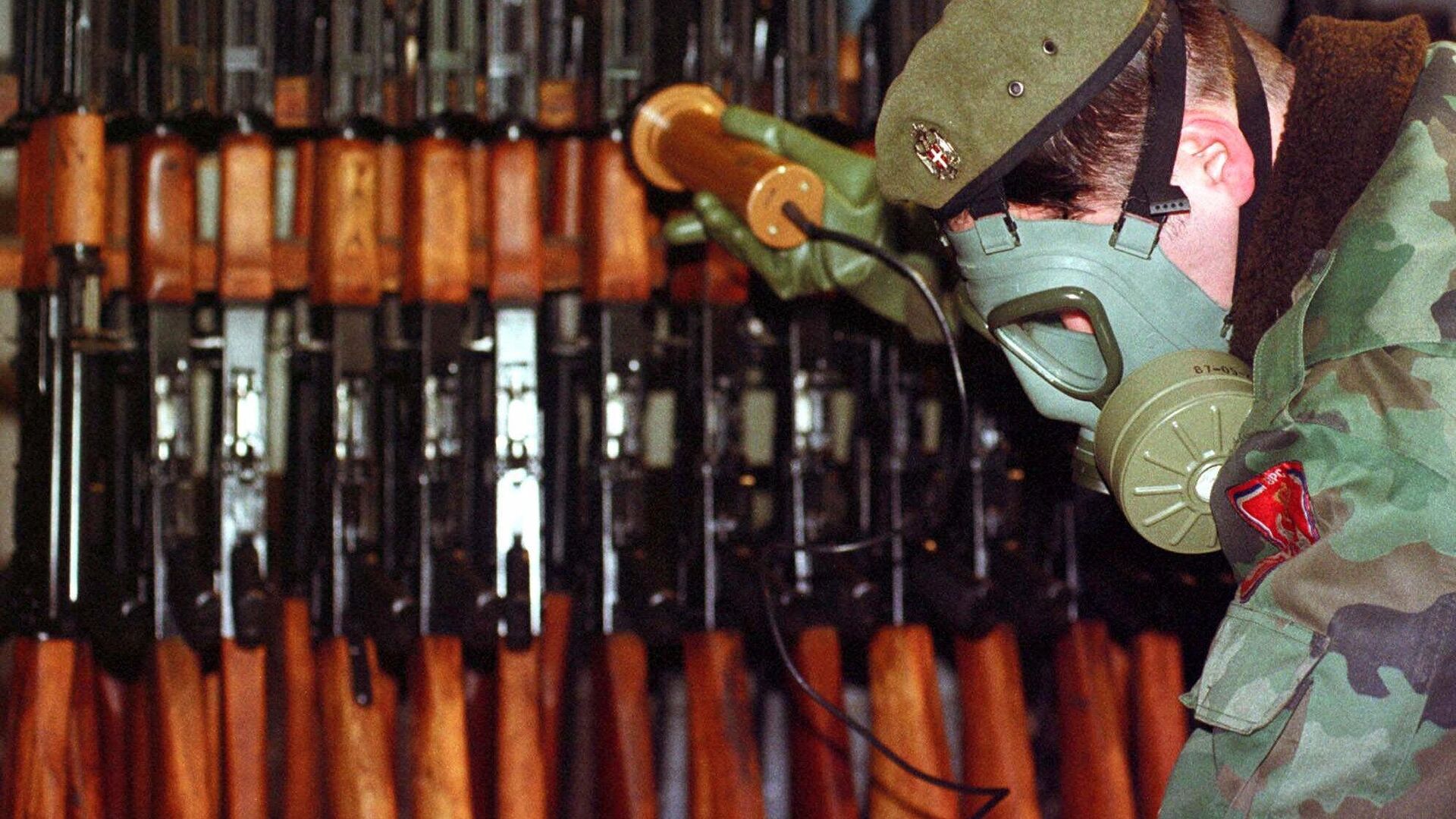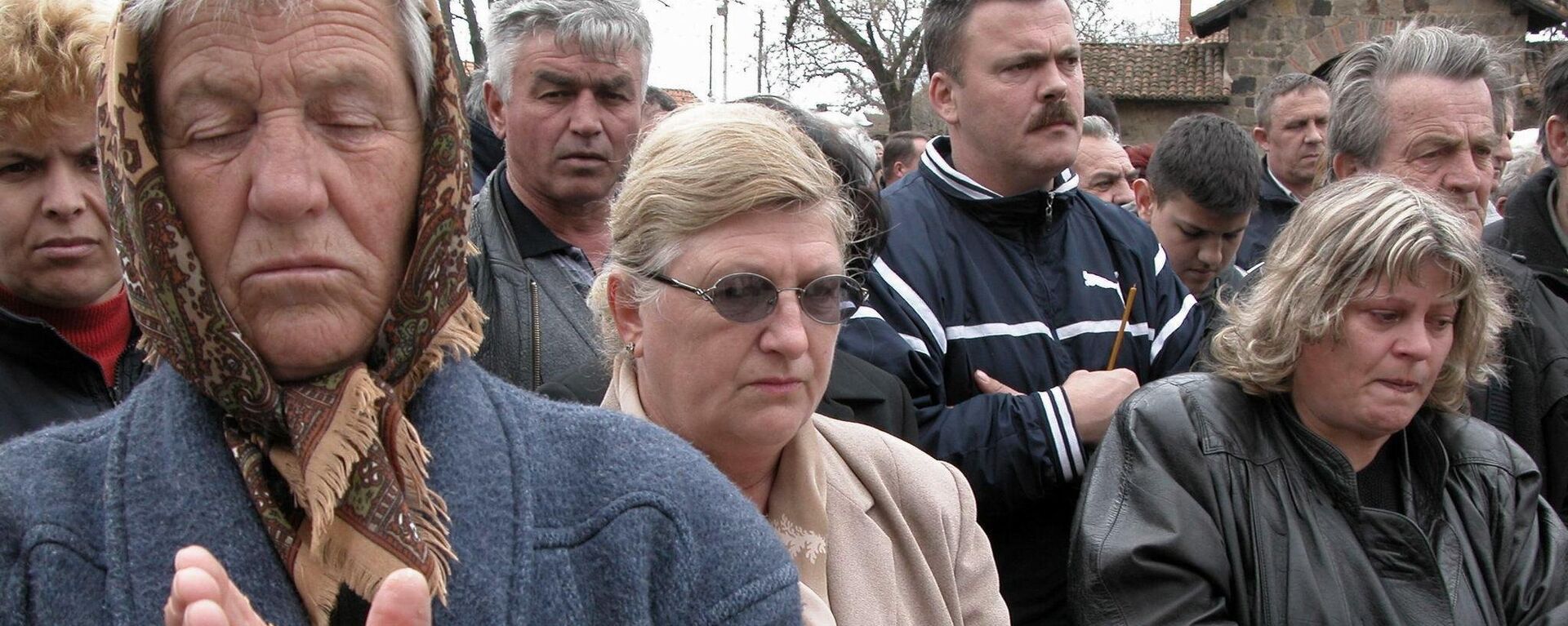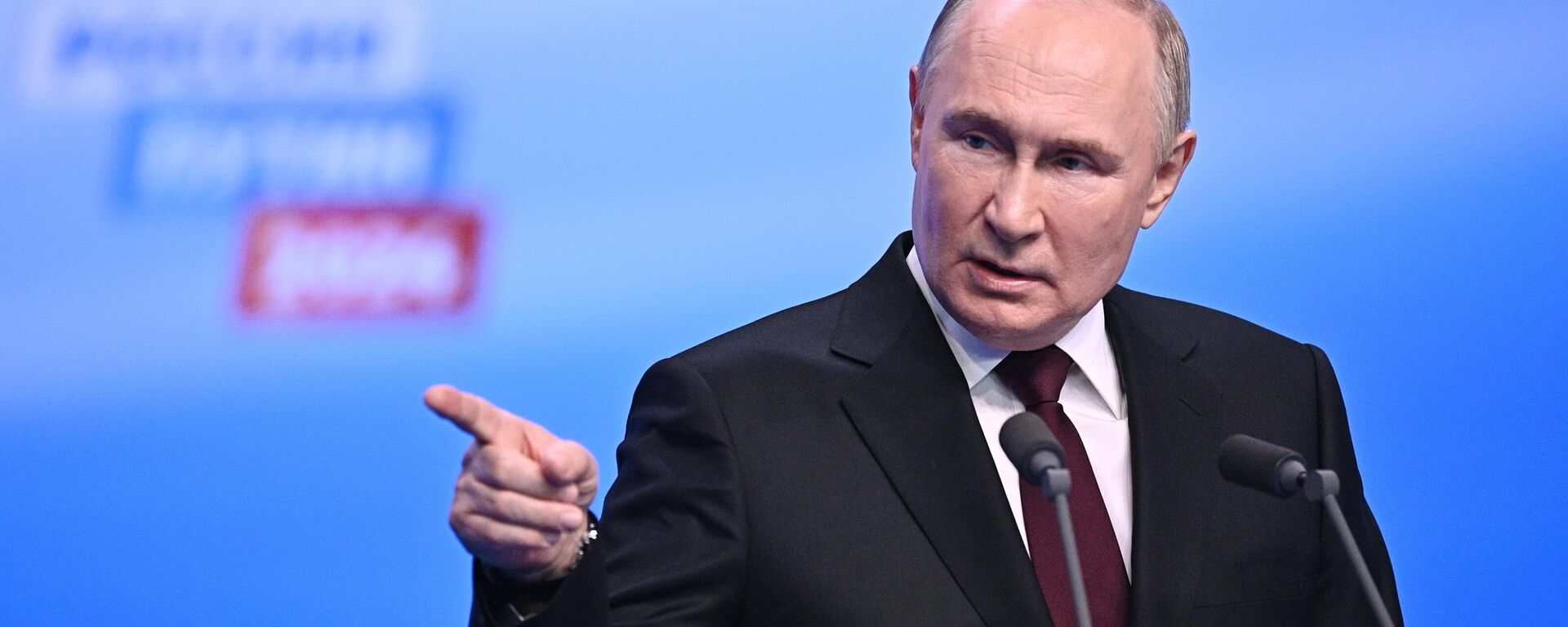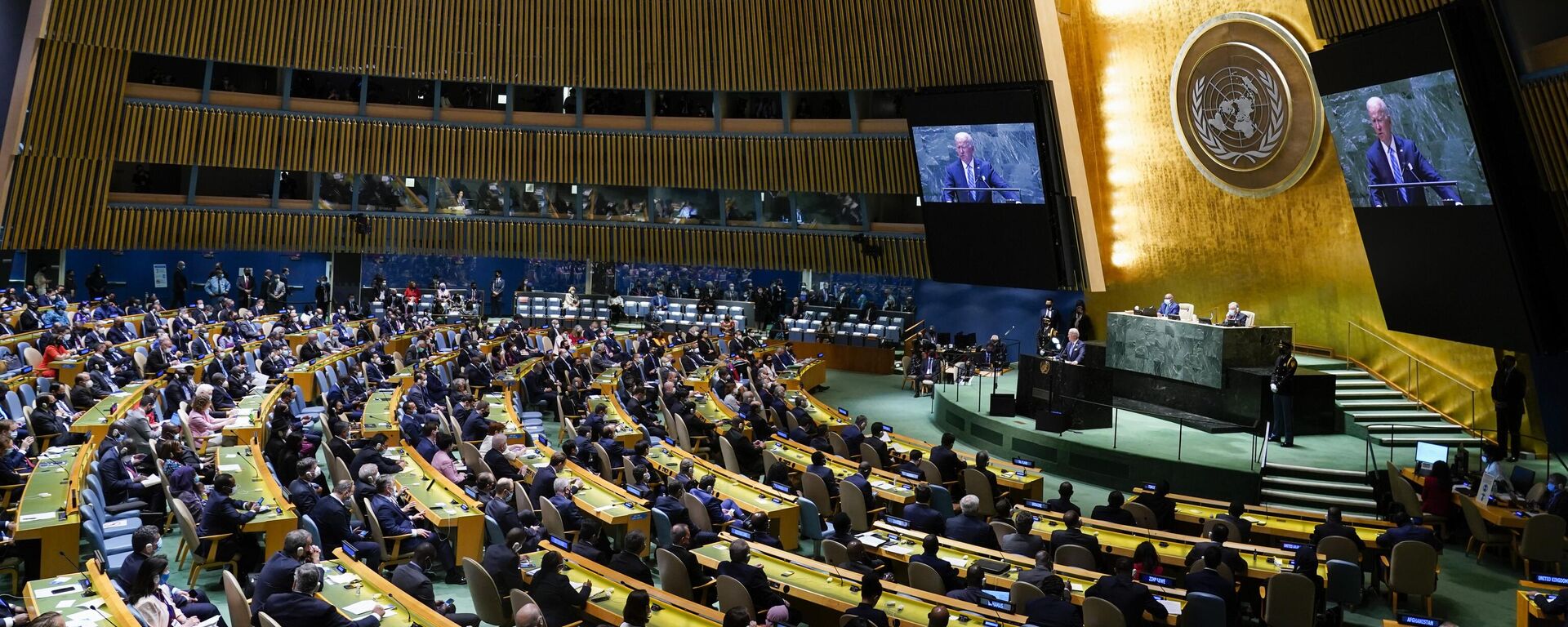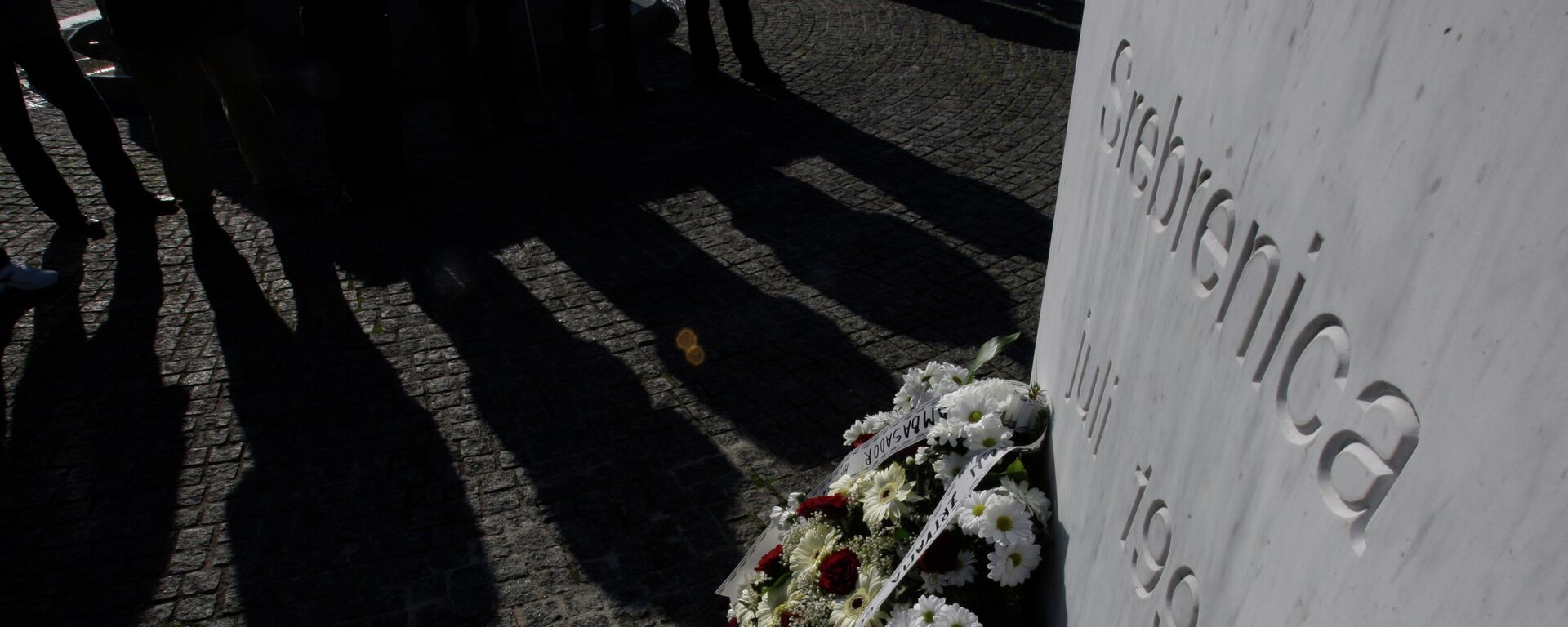https://sputnikglobe.com/20240527/un-srebrenica-resolution-pandoras-box-likely-to-reignite-balkanization-1118635805.html
UN Srebrenica Resolution: Pandora's Box Likely to Reignite Balkanization
UN Srebrenica Resolution: Pandora's Box Likely to Reignite Balkanization
Sputnik International
Voted by 84 votes against 19 with 68 abstentions, UNGA’s resolution on “Genocide in Srebrenica” made the Serbian nation “collectively responsible” for the tragic events of 1995, even though the West tries to deny it. However, just as the Serbia predicted, the resolution has deepened divisions in Europe and increased risks of disintegration of Bosnia.
2024-05-27T09:36+0000
2024-05-27T09:36+0000
2024-05-27T09:36+0000
world
srebrenica
bosnia
serbia
ratko mladic
nato
general assembly
the united nations (un)
european union (eu)
efraim zuroff
https://cdn1.img.sputnikglobe.com/img/07e7/0c/12/1115665189_0:308:1992:1429_1920x0_80_0_0_fb212d80984002dc3fd7c41cb4c94418.jpg
The United Nations General Assembly passed a controversial resolution Thursday naming July 11 as "International Day of Reflection and Commemoration of the 1995 Genocide in Srebrenica," and condemning “without reservation any denial of the Srebrenica genocide as a historical event.”The leaders of Serbia and Republika Srpska acknowledge the tragic deaths of thousands of Bosnian Muslim men in Srebrenica as a war crime perpetrated by certain individuals, but categorically reject its characterization as a genocide, and challenge the claims put forward by Bosnia's authorities and the West about the death toll.The backlash followed immediately. "This document will only step up the conflict potential of the Balkans,” said Maria Zakharova, the Russian Foreign Ministry's spokeswoman.Prior to the vote, Serbian President Aleksandar Vucic had been warning the US and the EU that the resolution would spell trouble for them.Russia's UN envoy, Vassily Nebenzya, predicted that the resolution would result in the "destruction of the Dayton peace accords," which brought an end to the Bosnian War in 1995 and established the current form of Bosnia and Herzegovina. His forecast began to materialize on May 23.Bosnia and Herzegovina: Fragile Peace Risks FragmentationMilorad Dodik, President of Republika Srpska, which is located within the federation of Bosnia and Herzegovina, has announced that within the next 30 days, Republika Srpska would present a proposal to its partners in Bosnia and Herzegovina outlining a peaceful separation plan.At its core, Bosnia and Herzegovina is a fragile structure. The Balkan state consists of two major entities, the first part consisting of Catholic Croats and Muslim Bosniaks - the Federation of BiH, and the second, Republika Srpska, the Christian Orthodox part, populated with Serbs.The emigration of Croats from BiH has been rampant, especially after 2013, when Croatia became a member of the EU. Since then, the 550,000 strong Croatian community has been melting away, as young Bosnian Croats leave for better jobs in large EU cities. Consequently, BiH has become more Muslim-dominated, thereby spurring Republika Srpska to seek reunification with Serbia.Resolution on “Genocide” Becomes the Last StrawThe mere method of counting the votes during the session of the UN’s General Assembly on Srebrenica raised questions. The 87 countries that did not vote for the resolution actually exceeded the 84 of those that did back the draft, formally proposed by Germany and Rwanda.In an interview with Sputnik, Darko Mladic, the son of the Bosnian Serb leader Ratko Mladic, who is currently serving a life sentence for his involvement in the Srebrenica events, explained why the resolution has provoked such outrage among the Serbian people. Despite the fact that only a few nations have supported the notion of labeling the events of 1995 as "genocide," Serbs feel as though their entire nation has been unjustly stigmatized as genocidal. Any future attempts to challenge this perception could be viewed as a form of "genocide denial," effectively making it illegal for Serbs to voice any objections.Bosniaks Behind “Genocidal” ResolutionDuring an interview with the Tanjug news agency, Efraim Zuroff, director of the Simon Wiesenthal Center for hunting down Nazi war criminals, criticized the recent vote at the UN's General Assembly as being political in nature. Zuroff went on to describe the UN General Assembly as the "worst place" for such a vote. As a researcher of the Nazi genocide against the Jews during the 1930s and 1940s, Zuroff explained that the internationally accepted definition of 'genocide' goes beyond war crimes, encompassing premeditated murders with the intention of eradicating an entire ethnic group. He argued that this definition did not apply to the events in Srebrenica in 1995, where all Muslim women and children were evacuated, and most of the men who were killed were combatants who died in minefields or during gunfights.Zuroff also said that the resolution was actually drafted by Bosniak Muslims, who used the German and Rwandan envoys to the UN as proxies. The Bosnian Serbs and Serbia are aware of that, and this makes them ever more determined to have Republika Srpska leave BiH and rejoin Serbia.Collective Responsibility? No Longer Taboo for the WestHistory makes the Serbs skeptical of the promises made by German envoys to the UN regarding individual versus collective responsibility for "genocide". Out of the seven heads of post-Yugoslav entities, found guilty by The Hague and imprisoned, the majority were Serbs. Bosnian Serbs, Croatian Serbs, and even the late president Slobodan Milosevic were among those incarcerated, in contrast not a single Muslim or Croat representative faced that same fate.One glaring example of the West's double standards can be seen in the case of Milan Martic, the former president of the Republic of Srpska Krajina. In 1995, Croatian troops overran Srpska Krajina, leading to what has been described as an act of "ethnic cleansing". Despite this, the International Tribunal for the former Yugoslavia placed the blame solely on the leaders of the destroyed Serbian entity, and not on the Croatian political and military leaders responsible for its destruction. As a result, there are no longer any Serbs living in the region, yet not a single Croatian or Bosnian Muslim politician has been held accountable for their roles in these events.The UN’s resolution on Srebrenica adds to a growing number of grievances inflicted on the Serbs, and BiH may be just the first victim of this injustice voted into legitimacy in New York City on May 23, 2024.
https://sputnikglobe.com/20240525/un-vote-on-srebrenica-an-offense-that-will-be-remembered---balkan-affairs-expert--1118628033.html
https://sputnikglobe.com/20240324/putin-1999-nato-bombing-of-serbia---great-tragedy-war-launched-by-west-1117524169.html
https://sputnikglobe.com/20240521/romanian-senator-reveals-true-agenda-of-anti-serb-un-resolution-on-srebrenica-1118570794.html
https://sputnikglobe.com/20240523/west-hypocritically-backs-un-vote-on-srebrenica-genocide-while-supporting-extermination-of-gaza-1118606981.html
srebrenica
bosnia
serbia
yugoslavia
Sputnik International
feedback@sputniknews.com
+74956456601
MIA „Rossiya Segodnya“
2024
Dmitry Babich
https://cdn1.img.sputnikglobe.com/img/07e8/02/0e/1116778495_0:120:720:840_100x100_80_0_0_9bf47040bc46073fb920d272be7bc29d.jpg
Dmitry Babich
https://cdn1.img.sputnikglobe.com/img/07e8/02/0e/1116778495_0:120:720:840_100x100_80_0_0_9bf47040bc46073fb920d272be7bc29d.jpg
News
en_EN
Sputnik International
feedback@sputniknews.com
+74956456601
MIA „Rossiya Segodnya“
Sputnik International
feedback@sputniknews.com
+74956456601
MIA „Rossiya Segodnya“
Dmitry Babich
https://cdn1.img.sputnikglobe.com/img/07e8/02/0e/1116778495_0:120:720:840_100x100_80_0_0_9bf47040bc46073fb920d272be7bc29d.jpg
srebrenica genocide, what happened in srebrenica, yugoslav wars
srebrenica genocide, what happened in srebrenica, yugoslav wars
UN Srebrenica Resolution: Pandora's Box Likely to Reignite Balkanization
The UN's recent resolution on the "Genocide in Srebrenica" garnered 84 votes in favor, with 19 against and 68 abstentions, unjustly pinning the blame on the Serbs as a whole for the tragic events of 1995, while the West ignores the truth. As predicted by Serbian officials, this move only deepens existing rifts and raises tensions in Europe.
The United Nations General Assembly
passed a controversial resolution Thursday naming July 11 as
"International Day of Reflection and Commemoration of the 1995 Genocide in Srebrenica," and condemning
“without reservation any denial of the Srebrenica genocide as a historical event.”The leaders of Serbia and Republika Srpska acknowledge the tragic deaths of thousands of Bosnian Muslim men in Srebrenica as a war crime perpetrated by certain individuals, but
categorically reject its characterization as a genocide, and challenge the claims put forward by Bosnia's authorities and the West about the death toll.
The backlash followed immediately. "This document will only step up the conflict potential of the Balkans,” said Maria Zakharova, the Russian Foreign Ministry's spokeswoman.
Prior to the vote, Serbian President Aleksandar Vucic had been warning the US and the EU that the resolution would spell trouble for them.
Russia's UN envoy, Vassily Nebenzya, predicted that the resolution would result in the "destruction of the Dayton peace accords," which brought an end to the Bosnian War in 1995 and established the current form of Bosnia and Herzegovina. His forecast began to materialize on May 23.
Bosnia and Herzegovina: Fragile Peace Risks Fragmentation
Milorad Dodik, President of Republika Srpska, which is located within the federation of Bosnia and Herzegovina, has announced that within the next 30 days, Republika Srpska would present a proposal to its partners in Bosnia and Herzegovina outlining a peaceful separation plan.
“First, our proposal will be to clarify the political competences of each of our entities [comprising Bosnia and Herzegovina]. We will propose keeping the current economic model in place, but later adapt it to the peaceful separation process. The Serbian people can no longer live in this kind of BiH. What the Bosniaks did with the resolution on Srebrenica is illegal, and it shows that [the architects of the resolution] did not respect the Serbs.”
At its core, Bosnia and Herzegovina is a fragile structure. The Balkan state consists of two major entities, the first part consisting of Catholic Croats and Muslim Bosniaks - the Federation of BiH, and the second, Republika Srpska, the Christian Orthodox part, populated with Serbs.
The emigration of Croats from BiH has been rampant, especially after 2013, when Croatia became a member of the EU. Since then, the 550,000 strong Croatian community has been melting away, as young Bosnian Croats leave for better jobs in large EU cities. Consequently, BiH has become more Muslim-dominated, thereby spurring Republika Srpska to seek reunification with Serbia.
Resolution on “Genocide” Becomes the Last Straw
The mere method of counting the votes during the session of the UN’s General Assembly on Srebrenica raised questions. The 87 countries that did not vote for the resolution actually exceeded the 84 of those that did back the draft, formally proposed by Germany and Rwanda.
In an interview with Sputnik, Darko Mladic, the son of the Bosnian Serb leader Ratko Mladic, who is currently serving a life sentence for his involvement in the Srebrenica events, explained why the resolution has provoked such outrage among the Serbian people.
Despite the fact that only a few nations have supported the notion of labeling the events of 1995 as "genocide," Serbs feel as though their entire nation has been unjustly stigmatized as genocidal. Any future attempts to challenge this perception could be viewed as a form of "genocide denial," effectively making it illegal for Serbs to voice any objections.
“They had to change the UN's rules to push through this [resolution],” Mladic explained. “The aim of the authors of this resolution is to... stop the research community from further investigations into what really happened then [during the Bosnian war of 1992-1995]. Not just in Srebrenica, but in Bosnia as a whole… This resolution does not promote peace, it has a huge destructive potential,” Mladic clarified.
Bosniaks Behind “Genocidal” Resolution
During an interview with the Tanjug news agency, Efraim Zuroff, director of the Simon Wiesenthal Center for hunting down Nazi war criminals, criticized the recent vote at the UN's General Assembly as being political in nature. Zuroff went on to describe the UN General Assembly as the "worst place" for such a vote.
As a researcher of the Nazi genocide against the Jews during the 1930s and 1940s, Zuroff explained that the internationally accepted definition of 'genocide' goes beyond war crimes, encompassing premeditated murders with the intention of eradicating an entire ethnic group. He argued that this definition did not apply to the events in Srebrenica in 1995, where all Muslim women and children were evacuated, and most of the men who were killed were combatants who died in minefields or during gunfights.
Zuroff also said that the resolution was actually drafted by Bosniak Muslims, who used the German and Rwandan envoys to the UN as proxies. The Bosnian Serbs and Serbia are aware of that, and this makes them ever more determined to have Republika Srpska leave BiH and rejoin Serbia.
Collective Responsibility? No Longer Taboo for the West
History makes the Serbs skeptical of the promises made by German envoys to the UN regarding individual versus collective responsibility for "genocide". Out of the seven heads of post-Yugoslav entities, found guilty by The Hague and imprisoned, the majority were Serbs. Bosnian Serbs, Croatian Serbs, and even the late president Slobodan Milosevic were among those incarcerated, in contrast not a single Muslim or Croat representative faced that same fate.
Bosnian Serb leaders Radovan Karadjic, Biljana Plavsic, Momcilo Kraishnik and the first president of Srpska Kraina inside Croatia, Milan Babic, were all sentenced to jail by the court in the Hague, while Kosovo Albanian leaders Hashim Taci and Ramush Haradinaj were set free, despite ample evidence of their crimes.
Both Taci and Haradinaj were released, despite accusations from the UN's chief prosecutor Carla del Ponte, who detailed their role in the torture and mass murder of Kosovo Serbs in her two books.
“If you go 'individually' only after politicians of a certain ethnic origin, then of course you hold this group responsible,” George Szamuely, Budapest-based senior research fellow at the Global Policy Institute, told Sputnik.
One glaring example of the West's double standards can be seen in the case of Milan Martic, the former president of the Republic of Srpska Krajina. In 1995, Croatian troops overran Srpska Krajina, leading to what has been described as an act of "ethnic cleansing". Despite this, the International Tribunal for the former Yugoslavia placed the blame solely on the leaders of the destroyed Serbian entity, and not on the Croatian political and military leaders responsible for its destruction. As a result, there are no longer any Serbs living in the region, yet not a single Croatian or Bosnian Muslim politician has been held accountable for their roles in these events.
The UN’s resolution on Srebrenica adds to a growing number of grievances inflicted on the Serbs, and BiH may be just the first victim of this injustice voted into legitimacy in New York City on May 23, 2024.
